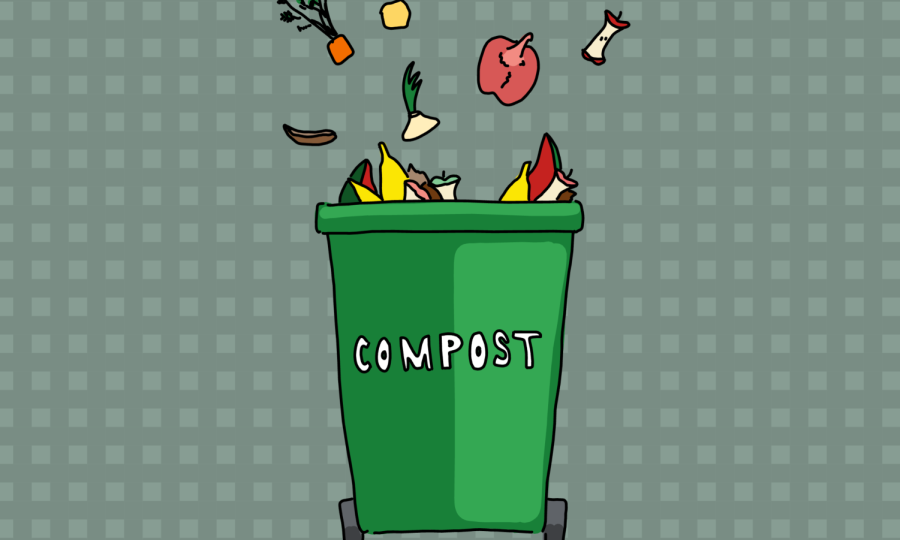Students advocate for increased compost bin presence on campus
Cats Who Compost provides bins near campus for students to drop off their compost.
January 5, 2023
Some Northwestern students are calling on the University to increase student access to composting bins.
All back-of-house kitchens at NU, including those in dining halls and Norris University Center, currently compost waste from food prep stations, leftover food and some prepared food, according to the sustainNU website.
NU composts about 3.6 tons of food waste per week, the majority of which is generated in kitchens and dish lines, according to Krista Brown, the sustainability and community engagement manager at Compass Group.
However, students living on campus have limited options to compost their own food waste outside of NU dining centers.
“As someone who thinks composting is a really good system — good for the world and for us as people -– I’m a little confused and frustrated with the University,” Weinberg sophomore Sophie Hyman said.
Students have the option to purchase a compost bin for their dorm room or off-campus housing, but many say this places too much responsibility on the individual.
Hyman said she thinks more students would compost if it were implemented campuswide because compost bins in dorms can become “gross” if not properly managed.
Weinberg sophomore Raya Young kept a personal compost bin in her dorm room last year, but she said the task became too much to keep up with.
“I live in a dorm, and it’s not super convenient having food rotting in your room, especially in such an enclosed space,” Young said. “I think it would be a great idea if the University provided composting bins.”
But implementing compost bins around campus for students to use is a complicated process.
A pilot program in 2019 required frequent bin monitoring and encountered contamination with trash and other non-compostable items.
SustainNU Program Administrator Cria Kay told The Daily in an email that compost collections have little to no tolerance for contamination.
“This makes it quite challenging to collect food waste that can actually be composted through bins sitting out in public,” Kay said.
One way to prevent contamination is increased education and awareness surrounding composting, according to SESP junior and Cats Who Compost Community Engagement Head Arthur Lebovitz.
Lebovitz said education, in conjunction with improved access to compost bins, could yield the best results. He added that simple steps such as instructional signage can improve composting practices.
“Even if you put a compost bin, people can still fill it up with trash, and then it’s the same thing,” Lebovitz said.
Cats Who Compost provides free compost drop-off sites at the Fiedler Hillel Center, Sheil Catholic Center and the University Christian Ministry.
As a barrier-free organization, all of Cats Who Compost’s services are free, according to first-year graduate student and Cats Who Compost Program Director Natalie Myren, but the club has to raise its own funds to continue its operations.
Lebovitz said he is frustrated by this lack of funding, because he views composting as a service that should be accessible to all people.
“Our club is stretched very thin, spending half of our time trying to fundraise and crowdfund and raise the funds to even be able to operate and provide our compost drop-off sites,” Myren said. “It feels like a task or role that should not be left to us to complete.”
Cats Who Compost partners with other student organizations, such as Campus Kitchen, Mayfest and Wild Roots to educate NU community members about composting.
Both Myren and Lebovitz said many more items, such as dryer lint and pizza boxes, can be composted than most students realize.
“It’s easier than most students expect, for those who’ve never encountered composting before, and it’s also such a huge waste reducer,” Myren said.
According to Myren, the club would be eager for the University to take over management of student-facing compost services, freeing up resources to focus on other initiatives.
Myren said if the University provided compost bins or drop-off spots, Cats Who Compost could concentrate on educational and social events. But in the meantime, the club will continue providing compost services for NU students.
“We live in a culture that overconsumes a lot, and we produce so much waste,” Hyman said. “Composting is a really easy way of mitigating our footprint on the world.”
Email: [email protected]
Twitter: @fionaroach03
Related Stories:
— NU Declassified: Uncovering Cats Who Compost on Campus
— Where does Northwestern’s food waste go?
— Cookies for Compost makes composting more accessible along with a sweet incentive


